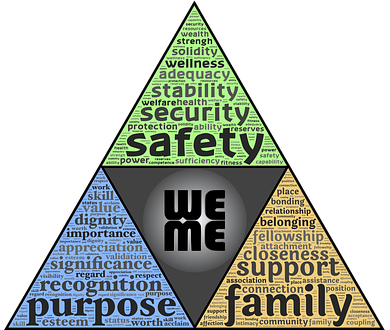
How to Find Purpose in Your Job: 9 Steps
“Your work will fill a large part of your life, and the only way to be truly satisfied is to do what you believe is great work. And the only way to do great work is to love what you do. If you haven’t found it yet, keep looking. Don’t settle. As with all matters of the heart, you’ll know when you find it.”—Steve Jobs
One day at work, Marian stood up from her desk and screamed!
The other workers scrambled from their cubicles to see what was wrong.
Marian’s coworkers found her trembling uncontrollably, crying, and sniffing loudly.
Almost in unison, her coworkers asked her what was going on. Did Marian feel ill? Had something tragic happened in her family? Should they call the boss?
Marian could only continue to cry, moan, and shake her head.
One coworker ran to call 9-1-1.
Other than the muffled moans and groans, no different sounds came from Marian.
Though she did not understand what was happening, one female coworker tried to comfort Marian, embracing her, rubbing her back, and murmuring soothing words.
After about fifteen minutes, the emergency team arrived, and Marian finally calmed down.
What had happened to Marian?
Why had Marian experienced a crying spell?
Could the cause have been something as simple as boredom and dissatisfaction at work?
What Is the Purpose of Work?
Before discussing how to find purpose in your job, first consider the meaning of work.
The word “purpose” itself means: “The reason for which something is done or for which something exists.”—Oxford English Dictionary.
In other words, why do we work? What’s the reason(s) we spend eight hours a day, five days a week, toiling at some task, day in and day out?
We work to satisfy our basic physiological needs, including our survival needs: food, clothes, and shelter.
Abraham Maslow introduced the concept of a hierarchy of needs in his 1943 paper titled “A Theory of Human Motivation,” where he suggests people are motivated to fulfill their basic needs before moving up the hierarchy of five human needs:
- Physiological needs
- Safety and Security
- Love and belonging
- Esteem
- Self-actualization
We meet our physiological needs by working.
We “work” because what we do translates into income (money) to feed, clothe, and house ourselves and our families.
We acquire money by working for an employer, or we may be self-employed.
Food, clothing, and shelter are all humans’ basic needs, and we need the means to acquire them.
However, the goal of this article is how to define (and find) meaningful work or a job where you find a purpose to meet your needs.
Why Have Purpose in Your Job?
If you feel that your job has no meaning beyond providing money to pay for your basic needs, you may be struggling with a lack of purpose, which can cause you to feel anxious and distressed.
You may also feel constantly bored, dissatisfied, or empty and will not do your best work.
Having a purpose in what you do for work, day in and day out is vital to your mental well-being.
As a general rule, we spend more time on the job than with our families or out having fun.
If you’re giving so much time and energy at work, it makes perfect sense to want the job to be enjoyable.
Remember Marian, whom I discussed at the beginning of this article?
Marian broke down emotionally and had a crying spell at work.
What could have caused Marian’s breakdown?
What could Marian have done to make her work more enjoyable?
Nine Steps to Create a Sense of Purpose at Work
“It isn’t what you have or who you are or where you are or what you are doing that makes you happy or unhappy. It is what you think about it.”—Dale Carnegie, How to Win Friends and Influence People
- Adjust your mindset. Mindset is a way of thinking, an established set of attitudes you have. You may have to shift your perspective at work.
“When you change the way you look at things, the things you look at change.”—Dr. Wayne Dyer
- Find honor in your work.
Many consider the type of work (the prestige) or how much money they earn and judge job satisfaction on these factors.
No matter how menial you consider your job, it has value.
For instance, suppose your job is to clean the offices and restrooms after hours.
If so, you might think about how what you do contributes to a cheerful and pleasant atmosphere because you ensure the surrounding areas are clean and neat as possible.
What’s important is what your work accomplishes for others.
- Strive for quality.
Do you have performance goals? If so, strive to reach them.
Be determined to give your best to your job but not expect perfection.
Be conscientious.
Work well done and completed on time promotes a satisfying feeling of accomplishment and is a reason for pride.
On the other hand, sloppy work can cost you your self-esteem while getting on your supervisor’s nerves and leading to tension and conflict.
- Avoid getting into a rut.
Everyone develops a specific pattern for doing things.
Change your work pattern from time to time to prevent your work from deteriorating into a dull routine. For instance, moving your desk to a new location could give you a lift.
- Keep physically fit.
Cardiovascular fitness is a must if you are to find purpose and enjoyment in your work.
Regular exercise will help you combat stress and release tension as your brain releases endorphins, immediately improving your mood.
And get plenty of rest. Relax on the weekends.
If you have that always-tired feeling, you might turn into a clock-watcher or an I-can’t-wait-until-the-weekend worker.
Keeping a close watch on the passage of time can increase your stress levels, which will make you feel like you are serving time in prison!
- Contribute to a cheerful atmosphere.
Be pleasant and friendly.
Don’t allow the “discontent” of others to rub off on you.
Toxic people, constant complainers, and negativity can be draining.
Keep a positive spirit.
Your attitude could rub off on others.
- Keep your mind alert.
So-called dull jobs that exasperate that feeling of “lack of purpose” are generally those that require little or no mental effort.
Keeping your mind alert can be a real challenge if your job is in this category.
Try meditating on previously learned material but avoid daydreaming.
The idea is to keep your mind alert by giving it something to do.
- Persevere
Do not allow problems that may arise at work to rob you of your purpose. Either solve them or learn to live with them.
- Be balanced.
Hard work is a good thing. Pursuing work goals is a good thing.
But too much of a good thing does not automatically make it better.
People for whom work is everything (more important than friends or family) are called workaholics.
They lack balance.
Striving for more and more could lead to serious personal problems and health issues and eventually to an early grave.
The Bottom Line
This article is not about blurring the lines between home and work.
Finding purpose in your job starts with knowing what matters to you; your beliefs and values.
And finding purpose in your work is not always easy to do, even when you follow the nine steps above.
But striving to find meaning in what you do day in and day out is critical to your mental health and well-being.
Purpose in your job will make your work more pleasant—you will find contentment.
Why not begin today with a new outlook and way of thinking about your work?
Use the practical and timeless ideas described in this article to feel better about your job and future.
“Pleasure in the job puts perfection in the work.”—Aristotle




